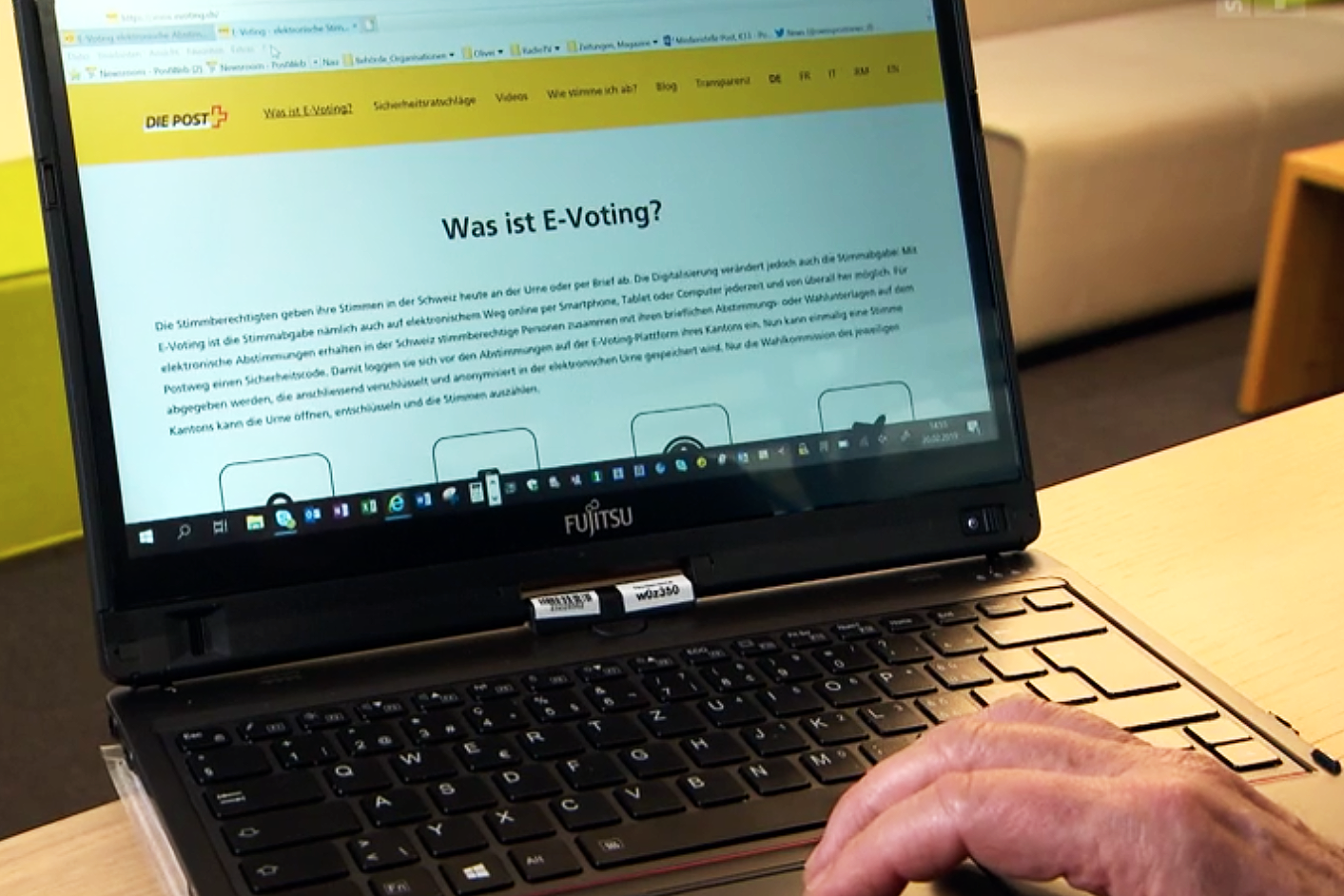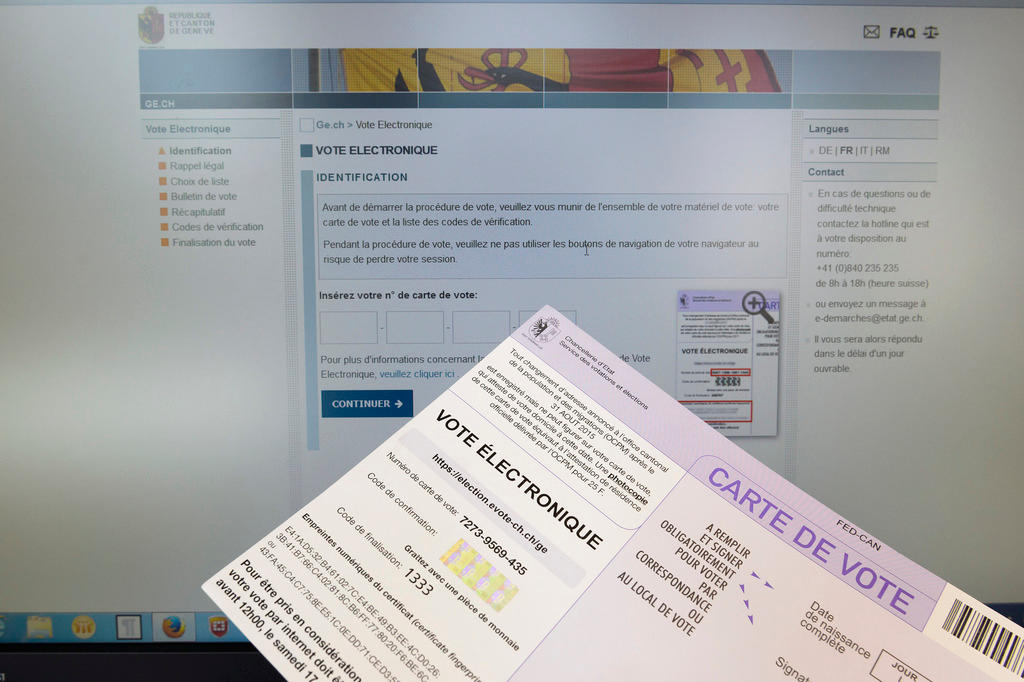Swiss Post set to relaunch its e-voting system

The controversial issue of e-voting is back: Swiss Post, which had halted the development of a project in July 2019, has bought a Spanish-owned system and plans to propose a platform ready for testing by 2021.
The purchase was reported on May 17 by the SonntagsBlick newspaper, which wrote that the deal between Swiss Post and Spanish firm Scytl had been settled for an unspecified amount.
The deal follows the bankruptcy of the Spanish company, with whom Swiss Post had been working on a system until flaws discovered last year sparked a political debate, which ended in the government dropping e-voting plans for the time being.
Swiss Post spokesman Oliver Flüeler confirmed to swissinfo.ch that last summer, despite the opposition, his company decided to continue developing a system on its own, and “after several months of negotiations” it secured the rights to the source code from Scytl.
The aim is now to propose an e-vote system by 2021 that “takes into account various federal particularities” and “responds even better to the high and specific requirements of a Swiss electronic voting system”, Flüeler said.
He added that Swiss Post takes public concerns about security and the role of foreign suppliers very seriously, but insisted that it doesn’t plan to go it completely alone.
“In future, Swiss Post will increasingly cooperate with Swiss universities of applied sciences, other higher education institutions and encryption experts,” he said. And “to guarantee maximum security at all times, Swiss Post “will reissue the new improved source code so that independent national and international experts can verify any weaknesses”.
Opposition
E-voting was first introduced in Switzerland on a limited basis in 2003, as part of ongoing tests. However, political opposition and scepticism over the safety of such a voting channel has been a constant over the years, and again with this latest twist, not everyone is happy.
Franz Grüter, a right-wing parliamentarian who also heads a people’s initiative calling for a moratorium on e-voting projects in Switzerland, criticised the Swiss Post move and called for a parliamentary inquiry.
“There are good reasons to check whether Swiss Post – a state-controlled company – acted correctly and paid a fair price, because the whole thing seems to lack transparency,” he said.
The parliamentarian and IT entrepreneur added: “It’s hard to believe that Swiss Post has paid an undisclosed price for a system which we already know doesn’t work properly. In other countries, too, Scytl systems have experienced major problems. Perhaps that’s precisely why the company went bankrupt”.
He said Swiss Post should have started from scratch and developed an entirely new system, “which could have restored trust and therefore considerably reduced opposition to e-voting” – an opposition that is widespread in Swiss political circles.

More
How e-voting became a fight for democracy
Parliamentary test
Grüter, who has worked in the IT field for 25 years, says he’s not against e-voting as such, and that “the day will come when there will be an e-voting system that offers all the necessary security guarantees.”
But a “new start” and “at least 3-5 years of work” is needed to develop such a secure system, he says.
“This corresponds exactly to the moratorium called for by our initiative. If this period wasn’t necessary, I would be happy to withdraw the initiative. But with the current Swiss Post system, I see no other option than to block activities. It’s a shame.”
The campaigners behind the initiative may well achieve their objective without having to collect the required number of signatures (100,000) to force a popular vote. Last December, the House of Representatives approved a parliamentary initiative calling for a halt to all e-voting tests and projects until security problems were resolved and citizens were ready to assume the costs of an online voting platform.
The proposal has not yet been submitted to the Swiss Senate for approval, but Grüter does not exclude the possibility that Swiss Post’s “serious strategic error” will help his cause.
The Organisation of the Swiss Abroad (OSA) has not yet expressed an opinion about the Swiss Post’s projects, as it has not yet received the information requested from the Federal Chancellery, its director Ariane Rustichelli told swissinfo.ch.
“But our position has not changed since the resolutionExternal link adopted by the Council of the Swiss Abroad in August 2019. We asked to examine the possibility of a new public institution taking over and developing canton Geneva’s e-voting system, which was unable to continue to develop for financial reasons – not because of technical problems,” she said.
Translated from French by Simon Bradley

In compliance with the JTI standards
More: SWI swissinfo.ch certified by the Journalism Trust Initiative




You can find an overview of ongoing debates with our journalists here. Please join us!
If you want to start a conversation about a topic raised in this article or want to report factual errors, email us at english@swissinfo.ch.